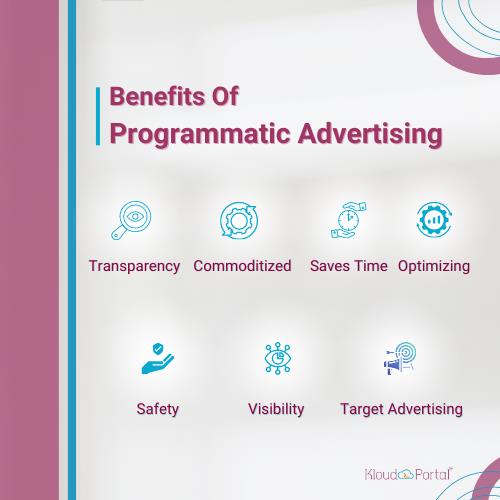Programmatic advertising is an effective way to boost brand awareness that keeps up with the metrics of any business site. It also makes a blocklist and an allowlist of websites.
The blocklist is to avoid fraud by blocking suspicious websites, where the brand must not appear because it might turn off the audience. The allowlist is the approved website to increase audience traffic. This segmentation list augments in providing better results than traditional demographics.
Programmatic Advertising In Simple Terms
Unlike the conventional manual digital or online advertising methods, programmatic advertising works by automating technology for buying ad space in online media. Programmatic media acquisition uses data insights and algorithms to serve ads to the right consumer at the right time and price.
How does it work?
Businesses in this form of advertising target consumers across the internet space. For instance, the algorithm used in advertising makes placing the ad on YouTube or Instagram effective.
Similarly, if the algorithm points out that the most effective use of the funds meant for ads is to direct the ad to a more specialized website with a high concentration of targeted consumers, it will be placed on that website.
- The programmatic ad tech process begins with the advertiser setting their audience and budget.
- Programmatic ad strategies require an overwhelming learning curve, but working with partners or agencies helps advertisers ease their foray into the programmatic advertising process.
- With potential challenges, businesses find it easy and beneficial to adopt programmatic ad strategies to gain efficiency, reach, transparency, and accountability.
- Decisions on online ad placements are made using data that includes the target consumers’ age, interest, location, and occupation. Companies use this data to launch targeted, effective ad campaigns like online video ads with the highest profits.
Benefits Of Programmatic Advertising
- Target advertising: One of the key benefits of the programmatic media ad process is its ability to target a specific audience. Programmatic advertising platforms use consumer data to identify and target users most likely to engage with the ad. This targeting can be based on a wide range of data, including demographic information, browsing history, and search queries.
- Commoditized: Programmatic ads are commoditized just like any commodity. Businesses are in the same online ad space, making some types of ad supply scarce. But the increasing use of programmatic ads has increased the amount of non-commoditized inventory becoming available to advertisers with software programs.
- Saves time: Programmatic advertising has benefits over traditional media buying. One of the main benefits is its efficiency, as the buying and selling process automation reduces the time and effort required for purchasing ad space. Online marketing also provides greater targeting capabilities, allowing advertisers to reach a specific audience more precisely.
- Optimizing: Additionally, programmatic advertising platforms offer real-time advertising and report the programmatic ecosystem analytics. This allows advertisers to optimize their campaigns to sell ads based on performance data.
- Safety, visibility, and transparency in programmatic targeting: While the programming of ads gives consumers greater control over visibility and where their digital ads appear, brand safety and transparency remain the top priority. Programmatic technology like Amazon Ads, a third-party solution, addresses these issues with safety visibility and transparency.
Programmatic Platforms-DSP And DMP
The technology used in programmatic marketing has gained worldwide momentum in how advertisers buy ad space, making it easier to reach their desired audience with precision targeting and more cost-effective. With Demand-side platforms (DSP) and Data management platforms (DMP), digital advertising has become a staple in the digital advertising space. The programmatic ad-buying process uses DSP, a software platform that allows advertisers to buy or change in real time through advertisement exchanges.
The DSP connects to multiple ad exchanges and uses algorithms to automatically bid on inventory that matches the target audience criteria for ads. The DSP can also use DMPs to help manage and analyze consumer data. DSP identifies the inventory that matches the audience criteria and automatically bids on the inventory in real-time. If the bid succeeds, the ad is served to the user in the placement.
Buying Advertisement Inventory
Programmatic ad platforms use technology to automate the buying and selling of advertisement inventory. These inventories refer to the space on a website or app where ads can be displayed.
Businesses prefer to market on suitable ad spots before considering the private or open market. This private market is known for ‘spot buying,’ or buying ad space immediately. Advertisers use programmatic ad platforms to buy inventory of ads in real-time through the exchange of ads, which connects buyers and sellers of ad space.

Programmatic Ad Exchanges
Multiple ad exchanges are available in the programmatic ad ecosystem for programmatic buying, including Google’s Ad Exchange (one of the largest and most well-known). These exchanges provide access to a wide range of real-time inventory, including internet, video, and native ads.
Programmatic adverts make an essential part of the internet advertising space, with eMarketer projecting that programmatic advertising costs will reach $59.45 billion in the US by 2023. This growth is partly due to the increasing use of programmatic technology to automate the buying and selling of inventory and the ability to reach a highly targeted audience.
Google’s ad network is a major player in the programmatic advertising ecosystem. The Google Display Network provides access to various ad inventory across millions of websites and apps. Google AdWords also offers programmatic advertising capabilities, allowing advertisers to purchase google ads inventory through the Google Ad Exchange.
Programmatic advertising makes use of AI and ML algorithms to automate the buying and selling of ad inventory. These algorithms analyze data and ad performance data to make real-time bidding decisions, optimizing campaigns for maximum performance.
Digital Marketing Platform
The rise of digital display advertising, media buying, and the increasing use of data management platform technology to automate the buying and selling of advertisement inventory, banner ads, and ad placements have made programmatic advertising essential to any modern marketing strategy.
KloudPortal is the best digital marketing agency that provides social media marketing, programmatic marketing, and advertising advantages to organizations for greater efficiency, targeting capabilities, real-time reporting, ROI, and analytics. KloudPortal creates content to automate the buying and selling of advertisement inventory by exchanging ads with audience data to target specific users. It has transformed how the marketing industry buys and sells ads by providing an efficient and effective way to reach a specific audience.

Deepa Kesavan
About The Author…
Meet Deepa Kesavan, an English teacher from Hyderabad with a Master’s degree in English and a passion for teaching, training and writing. Her articles have been featured in online and offline publications, showcasing her versatility and creativity as a writer. With an insatiable thirst for exploration and a love for new experiences, she has travelled far and wide, immersing herself in different cultures and gaining new perspectives. A people person at heart, she is always eager to connect with others and make a positive difference in their lives.

